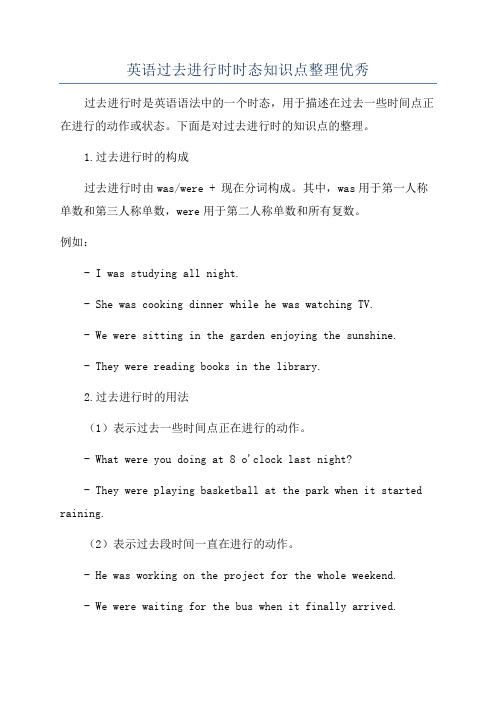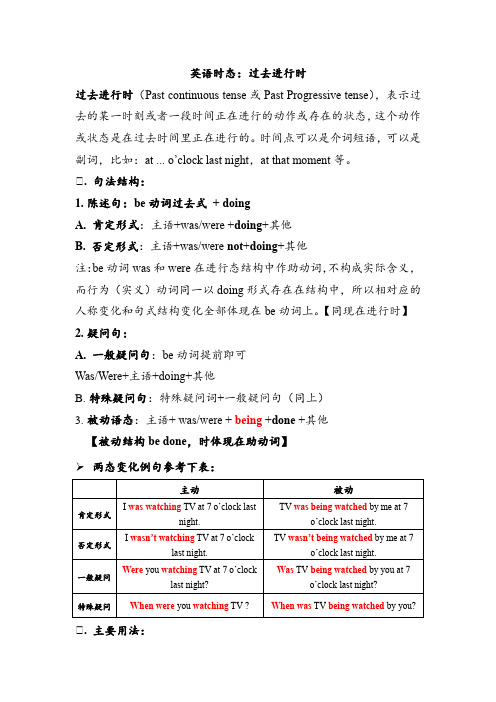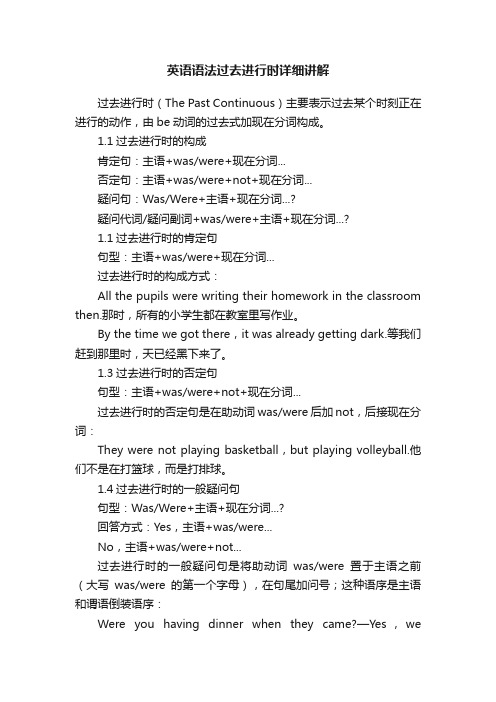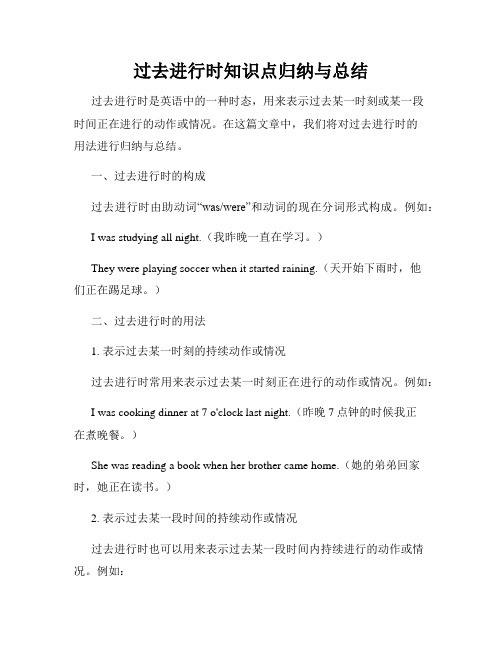第26讲 感叹句 过去进行时
英语过去进行时时态知识点整理优秀

英语过去进行时时态知识点整理优秀过去进行时是英语语法中的一个时态,用于描述在过去一些时间点正在进行的动作或状态。
下面是对过去进行时的知识点的整理。
1.过去进行时的构成过去进行时由was/were + 现在分词构成。
其中,was用于第一人称单数和第三人称单数,were用于第二人称单数和所有复数。
例如:- I was studying all night.- She was cooking dinner while he was watching TV.- We were sitting in the garden enjoying the sunshine.- They were reading books in the library.2.过去进行时的用法(1)表示过去一些时间点正在进行的动作。
- What were you doing at 8 o'clock last night?- They were playing basketball at the park when it started raining.(2)表示过去段时间一直在进行的动作。
- He was working on the project for the whole weekend.- We were waiting for the bus when it finally arrived.(3)表示过去一些时间点由于其他动作的发生而中断的动作。
- I was reading a book when my friend called me.- They were watching a movie when the power went out.(4)与过去一些时间点进行对比,表示过去的同时发生或进展的动作。
- While she was studying, her brother was playing games.- I was walking to work when I saw a car accident.3.过去进行时的否定形式和疑问形式否定形式:在was/were之后加not。
初中英语语法课件-过去进行时的基本用法

the Past Continuous Tense
过去进行时
定义:
过去进行时是表示 过去某个具体时刻正在 进行的事情或动作的时 态。
标志词 at the time, at that time ,at this time yesterday at 9:00 yesterday morning, (just)then,yesterday afternoon, the whole morning,all day yesterday,those days, from 9 to 10 last evening/night
3. 一般疑问句:Was/were+主语+v-ing形式+其他成分? Were you playing the piano at eight last night? 你们昨晚8点钟在弹钢琴吗?
一般疑问句的回答肯定回答: Yes,主语+was/were. 否定回答:No,主语+was't/weren't. Were you playing the piano at eight last night? 肯定回答-Yes, we were. 是的,我们在弹钢琴。 否定回答-No,we weren't. 不,我们没有在弹钢琴。
4.特殊疑问句:疑问词+was/were+主语+v-ing形式+其它? —What was he doing at this time yesterday? —He was reading books.
用法:
1.过去进行时表示过去某段时间内持续进行的动作或者事情。 We were watching TV from seven to nine last night. 昨天晚上七点到九点的时候我们在看电视。 What was he researching all day last Sunday? 上周日他一整天都在研究什么? I was watching the football match at 10:00 last night. 昨晚10点我在看足球赛。
初二英语语法精讲:过去进行时

初二英语语法精讲:过去进行时初二英语语法精讲:过去进行时过去进行时表示过去某一点时间正在进行的'动作或者过去某一段时间内一直进行的动作。
1. 构成was /were + doing,例如:I was watching TV at 9 oclock last night.at 9 oclock last night是时间点They were playing football all afternoon.all afternoon是时间段2. 过去进行时的标志词at 8 oclock last night, this time yesterday等。
例如:I was having lunch at home this time yesterday.昨天的这个时候我正在吃午饭。
At that time she was writing a book.那阵子她在写一本书。
(表示她在那段时间里一直在做那件事情。
) ★★练一练★★用括号中所给动词的适当形式填空。
1. This time yesterday I ____ ______(read)books.2. At 9 oclock last Sunday they ______ ______(have)a party.3. When I _____(come)into the classroom, she ________ ______(read)a storybook.4. She _____ ______(play)computer games while her mother ____ ______(cook)yesterday afternoon.5. I _____ ______(have)a shower when you _______(call)me yesterday.下载全文。
(最新整理)过去进行时讲解课件(42张ppt)

一般疑问句:Be (Was, Were)+主语+现在分 词+其他? 特殊疑问句: 1.疑问词+be(was , were)+现在分词+其他? (疑问词 做主语) 2.疑问词+be(was , were)+主语+现在分词+ 其他?
6. The students _a_r_e_g_e_t_ti_n_g(get) ready for the
picnic 2021/7/26 these days.
27
7.They _w__il_l _v_is_i_t_ (visit) the science museum next Monday. 8.Look, they _a_r_e_p_l_a_y_i_n_g (play) video games. 9.We _w__e_r_e_d_o_i_n_g (do) some cleaning at that
2. Tom ___ into the house when no one ___. A. slipped, was looking B. had slipped, looked C. slipped, had looked D. was slipping, looked
如:
They were always quarrelling.
他们老是吵架。
2021/7/26
10
4. 动词be的过去进行时也可表示过去一时的 表现或暂时的状态。
比较:
He was friendly. 他很友好。 (指过去长期如此)
过去进行时完美版课件

根据时间点选择
如果描述的是过去某个具体的时 间点或时间段发生的动作,应选 择过去进行时;如果与现在的状 态或结果有关,应选择现在完成
时。
06 练习与巩固
选择题练习
总结词
考察基础概念
详细描述
设计一系列选择题,测试学生对过去进行时的基本概念和用法的掌握程度,包括时态的构成、时间状 语的选择以及与过去其他时态的区分等。
02
它强调过去某个时间点上动作的 持续性,通常与时间段连用的时 间状语连用,如“at 8 o'clock yesterday morning”。
过去进行时的基本形式
过去进行时的基本形式为 “was/were + -ing”,其中 “was”用于第三人称单数, “were”用于第一人称、第二人称 和第三人称复数。
04 过去进行时的用法和例句
表示过去某个时间正在进行的动作
01
02
03
04
总结词
描述过去某个时间点正在发生 的动作,强调动作的持续性。
例句
昨天下午三点,我正在家里看 书。
例句
昨晚八点左右,他正在看电视 。
例句
上个星期天早上,他们正在公 园里跑步。
表示过去某个时间段内一直在进行的动作
总结词
描述过去某个时间段内 一直在进行的动作,强
可以互换使用
在一些情况下,过去进行时和现在完成时可以互换使用,但需要根 据语境和表达的重点来选择。
在实际应用中的选择
根据语境选择
根据上下文和语境来选择使用过 去进行时还是现在完成时,以确
保表达的准确性和自然度。
根据表达重点选择
如果需要强调动作的持续性或正 在进行的情景,可以选择过去进 行时;如果需要强调动作的结果 或对现在的影响,可以选择现在
英语时态:过去进行时

英语时态:过去进行时过去进行时(Past continuous tense或Past Progressive tense),表示过去的某一时刻或者一段时间正在进行的动作或存在的状态,这个动作或状态是在过去时间里正在进行的。
时间点可以是介词短语,可以是副词,比如:at ... o’clock last night,at that moment等。
Ⅰ. 句法结构:1.陈述句:be动词过去式+ doingA. 肯定形式:主语+was/were +doing+其他B. 否定形式:主语+was/were not+doing+其他注:be动词was和were在进行态结构中作助动词,不构成实际含义,而行为(实义)动词同一以doing形式存在在结构中,所以相对应的人称变化和句式结构变化全部体现在be动词上。
【同现在进行时】2.疑问句:A. 一般疑问句:be动词提前即可Was/Were+主语+doing+其他B.特殊疑问句:特殊疑问词+一般疑问句(同上)3.被动语态:主语+ was/were + being +done +其他【被动结构be done,时体现在助动词】➢两态变化例句参考下表:Ⅰ. 主要用法:1.(基本用法)过去进行时主要表示过去某一时间正在进行的动作。
He fell asleep when he was reading.2.用于描写故事情景,或提供故事发生的时间背景。
The fire was burning. Children were crying. Women were running about and men were trying to put it out.3.用过去进行时表示现在,主要是为了使语气委婉、客气。
此类动词主要有hope, wonder, think, expect等。
【一般过去时也有类似用法,但比较而言,用过去进行时显得更客气,更加不肯定。
】I was wondering if you can give me a hand.4.表示从过去某一时间看将要发生的动作,常表示过去“渐渐”、“快要”、“越来越”、“马上”等含义,常见的此类动词有come,go,start,begin,leave,arrive,get,become,turn等非持续性(位置的瞬间移动或状态的瞬间改变)动词,偶尔有些持续性动词如do,stay,take 等常表示过去“将要”。
英语语法过去进行时详细讲解

英语语法过去进行时详细讲解过去进行时(The Past Continuous)主要表示过去某个时刻正在进行的动作,由be动词的过去式加现在分词构成。
1.1过去进行时的构成肯定句:主语+was/were+现在分词...否定句:主语+was/were+not+现在分词...疑问句:Was/Were+主语+现在分词...?疑问代词/疑问副词+was/were+主语+现在分词...?1.1过去进行时的肯定句句型:主语+was/were+现在分词...过去进行时的构成方式:All the pupils were writing their homework in the classroom then.那时,所有的小学生都在教室里写作业。
By the time we got there,it was already getting dark.等我们赶到那里时,天已经黑下来了。
1.3过去进行时的否定句句型:主语+was/were+not+现在分词...过去进行时的否定句是在助动词was/were后加not,后接现在分词:They were not playing basketball,but playing volleyball.他们不是在打篮球,而是打排球。
1.4过去进行时的一般疑问句句型:Was/Were+主语+现在分词...?回答方式:Yes,主语+was/were...No,主语+was/were+not...过去进行时的一般疑问句是将助动词was/were置于主语之前(大写was/were的第一个字母),在句尾加问号;这种语序是主语和谓语倒装语序:Were you having dinner when they came?—Yes,wewere./No,we weren't.他们来的时候,你们是否在吃饭?——是的,在吃饭。
/不,不在吃饭。
1.5过去进行时的特殊疑问句句型:疑问代词(主语)+was/were+现在分词...?疑问代词/疑问副词+was/were+主语+现在分词...?过去进行时的特殊疑问句是将疑问代词/疑问副词置于助动词was/were之前(was/were的第一个字母无需大写),和一般疑问句差不多,在句尾加问号;这种语序是主语和谓语倒装语序。
过去进行时知识点归纳与总结

过去进行时知识点归纳与总结过去进行时是英语中的一种时态,用来表示过去某一时刻或某一段时间正在进行的动作或情况。
在这篇文章中,我们将对过去进行时的用法进行归纳与总结。
一、过去进行时的构成过去进行时由助动词“was/were”和动词的现在分词形式构成。
例如:I was studying all night.(我昨晚一直在学习。
)They were playing soccer when it started raining.(天开始下雨时,他们正在踢足球。
)二、过去进行时的用法1. 表示过去某一时刻的持续动作或情况过去进行时常用来表示过去某一时刻正在进行的动作或情况。
例如:I was cooking dinner at 7 o'clock last night.(昨晚7点钟的时候我正在煮晚餐。
)She was reading a book when her brother came home.(她的弟弟回家时,她正在读书。
)2. 表示过去某一段时间的持续动作或情况过去进行时也可以用来表示过去某一段时间内持续进行的动作或情况。
例如:They were living in London for three years.(他们在伦敦住了三年。
)I was working on this project all day yesterday.(我昨天一整天都在做这个项目。
)3. 表示过去某一时刻的计划或安排过去进行时还可以用来表示过去某一时刻的计划或安排。
例如:We were supposed to go to the movies, but it started raining.(我们原本计划去看电影,但天开始下雨了。
)She was going to meet her friends, but she got sick.(她原本打算去见朋友,但她生病了。
)4. 与时间状语连用过去进行时通常与表示过去的时间状语连用,以强调动作或情况的持续性。
- 1、下载文档前请自行甄别文档内容的完整性,平台不提供额外的编辑、内容补充、找答案等附加服务。
- 2、"仅部分预览"的文档,不可在线预览部分如存在完整性等问题,可反馈申请退款(可完整预览的文档不适用该条件!)。
- 3、如文档侵犯您的权益,请联系客服反馈,我们会尽快为您处理(人工客服工作时间:9:00-18:30)。
感叹句定义:用来表达较为强烈的情感如惊讶、喜悦等的句子。
感叹句的构成方法有三种:1.陈述句,疑问句可构成感叹句。
例如:It sounds great! 听起来真棒!Isn’t it interesting! 真是有趣极了!2.单词或短语都可构成感叹句(省去其它句子成分)如:Oh, my gold! 我的天哪!Help!救命!以上两种纯属娱乐,中考题不考!!!3.常用What或How来引导,位于句首放在它们与所修饰的词前面,其他部分用陈述句语序。
由what引导的感叹句是用来强调修饰名词的,名词前可有其他的定语成分(即形容词或冠词)。
单数可数名词前要加不定冠词a / an,复数可数名词或不可数名词前不用冠词。
在使用过程中,常用的句型有:1.What + a / an +adj.+可数名词单数+主语+谓语+其他成分!例如:What a strong boy he is! What an honest girl Mary is!2.What +adj.+可数名词复数/不可数名词+主语+谓语+其他成分!例如:What brave soldiers they are!What fine weather it is today!由how引导的感叹句是用来强调修饰形容词或副词的。
修饰形容词时,句中的谓语动词常用用系动词,如am, is等;修饰副词时,则句中的谓语动词常用行为动词,如fly, run等。
在使用过程中,常用的句型有:1.How + adj.+ a / an +名词+主语+谓语+其他成分!例如:How exciting a football match it is! How kind an old man he is!2.How + adj./adv.+ 主语+谓语+其他成分!例如:How tall Yao Ming is! How fast the dragonfly flies!解题技巧:1.确定是考察感叹句后,先省略其主语和谓语,只需观察省略句子主语和谓语后的部分。
2.观察题干或选项中有无冠词a/an(可数名词复数或不可数名词前不用冠词)。
3.无冠词时,观察句中有无名词,有名词用what,无名词用how4.有冠词时,看冠词的位置,如果紧跟在what或how 后,用what.否则用how。
过去进行时定义:(1)表示在过去某一时间正在进行的动作(2)表示在过去某一段时间内一直持续进行的动作构成:主+ was / were + 现在分词词形变化:略(同现在进行时)句型变化:略(同现在进行时)时间标志:then,at that time,this time yesterday,this morning, the whole morning, just now,a moment ago from nine to ten last evening, 或when引导的时间状语从句等。
例:I was doing my homework when my mother came to home.用法:(1) 过去进行时可表示按计划、安排过去某时刻将要发生的动作。
如:He said they were leaving for Beijing this afternoon. 他说他今天下午要去北京。
(2)某一动作发生时另一动作正在发生,其中一个在由when或while引导的时间状语从句中。
I was studying at college while my brother was teaching at university.( )1. ___ pretty your dress is!A WhatB What aC HowD How a( )2.—We are going to take part in Running Man. —______ exciting news!A. WhatB. What anC. HowD. How an( )3.— Dad, what do you think of the picture I drew?—________ ! It’s the nicest one that I have ever seen.A. What beautifulB. How terribleC. How wonderfulD. What wonderful picture ( )4._______ fat sheep they are!A. WhatB. What aC. HowD. How a( )5.—___________ useful advice you have given to me! Thank you so much!A. What aB. What anC. HowD. What()6. -What did Mr Jones do before he moved here?-He ____ a city bus for over twenty-five years.A. is drivingB. droveC. has drivenD. drives()7.Look! Lucy _____ under the tree.A. readsB. is readingC. was readingD. read()8. Jim _____ a letter to his parents at 7:30 last night.A. had writtenB. wroteC. would writeD. was writing()9. Don’t make so much noise. The children an English lesson.A.haveB. are havingC. were havingD. had()10.—Where is your English teacher? I’m looking for him everywhere.—He _____ the Internet in the computer room.A. will searchB. has searchedC. searchedD. is searching()11. Listen, our teachers ______ Red Songs in the next room.A. sangB. are singingC. singsD. were singing()12. Yesterday evening, I _____ along the street when I suddenly met my maths teacher.A. walkB. walkedC. was walkingD. am walking()13. Look! The boys _______ football on the playground.A. playsB. playC. are playingD. played()21. The girl with two cats in the yard when the earthquake happened.A. was playingB. is playingC. are playingD. were playing()14. Today is Women's Day. My father and I________ a special gift for my mother now.A. makeB. madeC. are makingD. were making()15.A big party was held last night, the teacher _____ singing and dancing happily at the party.A. isB. wasC. areD. were()16. Mr. Li _____ us a report on our environment when the earthquake happened in Japan.A. gaveB.is givingC.was givingD. gives()17.----Where is Michael? ----He ____ TV at home, I think.A. watchesB. watchedC. is watchingD. was watching()18. I along the road when I saw Peter. So we stopped and had a chat.A. walkedB. was walkingC. would walkD. had walked()19. —What did the teacher say just now? —Sorry. I didn’t catch it. I ____ something else.A. thinkB. will thinkC. was thinkingD. had thought()20. — May I speak to Mr Morgan? — Sorry. He______ on the farm.A. works.B. workedC. is workingD. has worked()21. —What were you doing this time yesterday? —I ____on the grass and drawing a picture.A. sitB. satC. am sittingD. was sitting()22.— Where were you at 7:00 last night? — I _____ to my mom at home.A. writeB. was writingC. wroteD. am writing()23. — Amy, I called you yesterday evening, but nobody answered the phone.— Oh, I ______ a walk with my mother at that time.A. takeB. tookC. am takingD. was taking()24. The workers _a new bridge now. The traffic in Guangzhou will be better soon.A. buildB. were buildingC. builtD. are building()25. —Why didn’t you go to play football with us yesterday afternoon?—I _____my mother with the housework then.A.helpedB. was helpingC. had helpedD. have been helping( )1. Langlang is a great pianist. He _______ great interest in piano when he was very young.A. sharedB. hatedC. showedD. played( )2. Wang Yanbo’s mother is fond of _______.A. cookB. cookerC. cookingD. cooked( )3. Why _______ go out for a walk after supper?A. don’tB. didn’tC. notD. doesn’t( )4. Hobbies can _______ us happiness, friendship and knowledge, so we should have hobbies.A. getB. takeC. tookD. bring( )5. —What’s your hobby?—I _______ listen to music, but now I enjoy dancing.A. am used toB. used toC. am usedD. use to( )6. I _______ draw, but now I am fond of it.A. wasn’t use toB. didn’t use toC. am not use toD. don’t use to( )7. —Would you mind _______? —Not at all.A. provide help for usB. provide us with helpC. providing help for usD. providing us for help( )8. His mother taught him _______ and read.A. writeB. writingC. to writeD. writes( )9. —What’s your hobby, please?—I _______ dancing.A. am fond ofB. enjoyC. preferD. A, B and C( )10. —_______ Li Lei _______ play computer games? —No, he _______.A. Did; use to; didn’tB. Did; used to; didn’tC. Does; use to; doesn’tD. Does; used to; doesn’t(A)根据句意及首字母提示补全单词。
